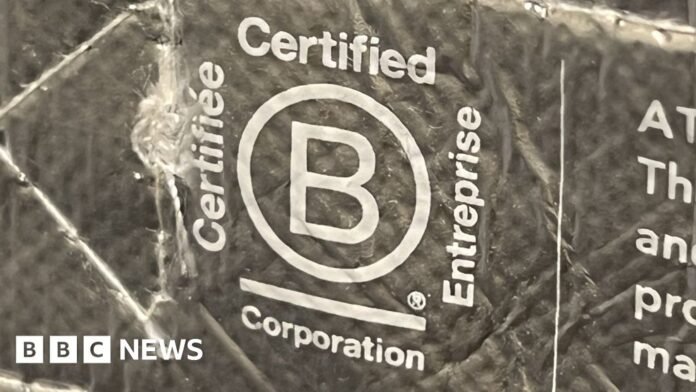Business reporter
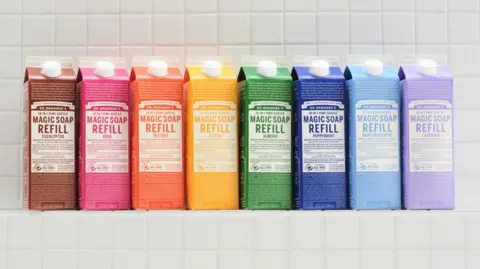 Dr Bronner’s
Dr Bronner’sEarlier this year natural soap company Dr Bronner’s decided that enough was enough.
It announced that it was quitting B Corp, the global certification scheme that honours companies for having high standards when it comes to their social and environmental performance.
Dr Bronner’s, a California-based, family-run business with 323 employees, had been a member for 10 years.
But it said that the accreditation wasn’t strict enough, and it accused the international organisation that runs it, B Corp, of being too quick to allow some of the world’s largest companies to join. It accused the scheme of “enabling greenwashing and purpose washing by multinationals”.
Dr Bronner’s singled out its continuing opposition to coffee capsule brand Nespresso getting B-Corp certification in 2022. Nespresso is owned by Swiss food giant Nestlé.
In 2020 Nespresso was hit by accusations that some of its coffee suppliers in Guatemala were employing young children. It responded to the scandal at the time by saying that it “had a zero tolerance of child labour” and would act “immediately”.
Announcing that it was leaving B Corp, Dr Bronner’s said in a statement that it was “unacceptable to us” to be lumped in “with large multinational CPG [consumer packaged goods] with a history of serious ecological and labour issues”.
It added: “The integrity of the B Corp certification has become compromised and remaining certified now contradicts our mission.”
In response, a Nespresso spokesman tells the BBC that its B Corp certification is “an acknowledgement of our long-standing commitment to sustainability, particularly our efforts to support coffee farmers… and a result of rigorous B Impact Assessment covering all environmental and social aspects of our business and supply chain”.
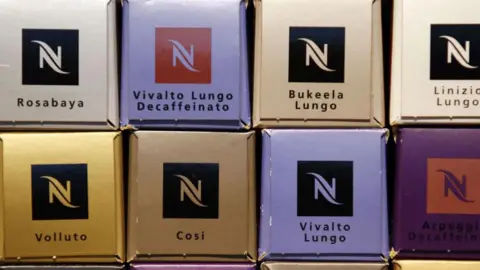 Getty Images
Getty ImagesThe B Corp scheme was founded in 2006, and now has more than 9,600 members across 102 countries and 161 industries. The “B” stands for the word “beneficial”, and gaining accreditation can help companies attract more environmentally and socially conscious customers.
B Lab declined to answer how many member firms are multinationals, but it said that more than 96% are small and medium-sized businesses.
And while it has defended Nespresso’s membership, next year it is introducing new “more rigorous” certification standards.
Currently applicant firms can obtain B Corp certification if they achieve at least 80 points out of a total 200 across a number of environmental and social criteria. So they can be weak in one area, but make up for this in others.
This points system will end from 2026, and be replaced with minimum requirements across seven key areas that it labels – purpose and shareholder governance; fair work; justice, equity, diversity and inclusion; human rights; climate action; environmental stewardship; and government affairs and collective action.
In addition, third-party verification of companies’ performances is being introduced, and firms will also have to show that they are continuing to improve standards.
“This is really a sign to make the standards more rigorous and raise the bar for businesses,” says Chris Turner, chief executive of B Lab UK. “We are becoming more transparent and credible as a certification.”
Yet he denied that the new standards were aimed at multinational members. “The new standards are not designed to address a specific challenge about big business joining… We have increased expectation now of what being a force for good looks like. And within that we acknowledge that bigger businesses have a bigger potential for impact and need more rigorous checks.”
He adds: “We will be working really hard to create a pathway for B Corps to certify on new standards, but what that means will differ for each business. Some businesses will find it easy, while for some businesses there will be significant work to do to meet new standards.”
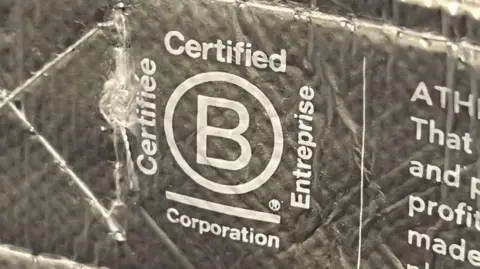 Getty Images
Getty ImagesWhether the change will be enough to stop smaller firms like Dr Bronner’s walk away from B Corp remains to be seen. UK pet food company Scrumbles was another that gave up its certification this year.
“I saw that growing membership was the focus rather than pushing forward sustainability efforts,” says Aneisha Soobroyen, co-founder of the London-based company.
Instead of paying its annual recertification fee of £8,500, an amount determined by a company’s revenues, Scrumbles donated the money to Save The Children.
Nancy Landrum, professor of sustainable business transformation at Munich Business School, says that B Corp “is a good starting point”.
“It is a great certification scheme for businesses that are just beginning their sustainability journey, and that want to decrease unsustainable activities, and increase sustainable activities.
“But B Corp, and all of the most frequently used schemes, simply don’t go far enough.”
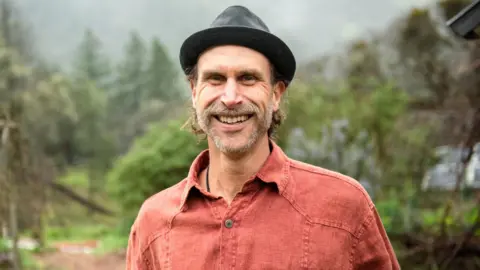 Dr Bronner’s
Dr Bronner’sHaving B Corp accreditation can help a company boost its sales. But leaving the scheme is unlikely to hit Dr Bronner’s says chief executive David Bronner.
“We think our brand strength is enough.”
Whether the company might reapply for B Corp in the future, Mr Bronner says they “would re-join tomorrow” if there were tougher rules placed on the supply chains of multinational members.
In the meantime it has sent up its own rival scheme called Purpose Pledge. “It gets to the heart of what we think is a true missionary driven company,” says Mr Bronner. “Paying living wages, and holder each other accountable, and having supply chain integrity.”
So far he says 14 other companies have signed up.



